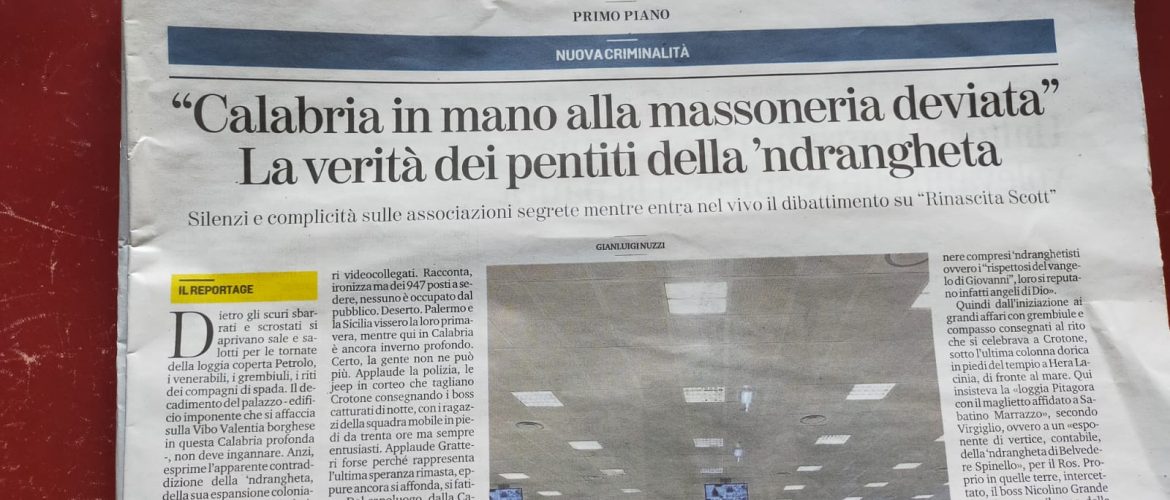A few days ago, an article appeared in the newspaper La Stampa that reports that in the bunker court of Lamezia Terme (where the trial against 325 alleged members of the Mancuso criminal clan began) “of the 947 seats, none is occupied by the public”. It is also argued that, starting with the informer / accuser himself (certain Cosimo Virgiglio), most of the defendants are registered in the local “deviant” Freemasonry or in any case colluded with it.
The author of the article does not explain the reason and yet, not escaping the easy parallelism ‘Ndrangheta = Freemasonry (and vice versa), I consider it appropriate to provide some clarification, with the premise that each event must be evaluated considering the historical-social context in which it happens.
The following explanation is forcibly resolved in some statements, which nevertheless deserve further study.
1) – The ‘Ndrangheta is the Calabrian expression of organized crime, but it has different origins and evolutions than the other kinds of “mafia”, while maintaining the common denominator of criminal activity.
– It is known that the unification of Italy was carried out with forced “annexations” (disguised as a referendum, in times of prevalent illiteracy) after which the united State then disinterested in the South, except for episodic and bloody interventions against banditry.
– Unlike Sicily and Campania which enjoyed a consolidated cultural heritage and prosperity in the centuries (remember the era of Emperor Frederick II, the Arab-Norman domination, the Borbone Kingdom), Calabria has always remained on the margins, a sort of southern Cinderella.
– In this unfortunate region, the absence of the state for so many decades caused that the disputes that arose between the inhabitants (mostly illiterate shepherds and peasants exploited by their owners) were resolved with a kind of “do it yourself” justice, through the intermediation of individuals deemed most influential.
-From there to the birth of a coterie at first “of justice”, and then of clear prevarication, the step was short.
– Thus, the ‘Ndrangheta was born, whose rite of affiliation is in some respects similar to the Masonic one.
– Over time it has progressively infiltrated the local and national institutional ganglia and also the local Freemasonry: for this reason, it, like the Sicilian Mafia, is much more dangerous than Campania and Apulian criminal organizations, which are mostly committed to low-ranking delinquent actions.
2) – Freemasonry in Calabria was born well before the ‘Ndrangheta: originating from the adhesion of various lords of the area, it had an undisputed propulsive activity in the years of the Italian Risorgimento (XIX century).
– The difference between “regular” Freemasonry and “deviant” Freemasonry consists in the fact that the former has the purpose of “making a good man better”, pursues the principles of “Freedom-Equality-Brotherhood” and operates in full compliance with the laws of State. The other apparently pursues less noble aims.
3) The difference between the consideration enjoyed by Freemasonry in democratic Western countries compared to what happens in Italy appears singular. As an example, I recall the address of the French President J. Chirac to the French Freemasons at the celebration of the 257th year of the constitution of the Order of Freemasons in France: he called them “Brothers, Fathers of the Republic”, and he paid tribute to their “active role in defense and affirmation of the republican values, a role of supervision and reflection ”.
Precisely “reflection”, a typical tool of the free thought, prompted me to reflect on the reason why the relationship between the Italian state and Freemasonry is so different in Italy.
On this too, it is necessary to consider the historical-social-cultural context.
– Before the Risorgimento epic, the State of the Church reigned over a large part of central Italy.
– In 1738 Pope Clement XII issued a condemnation and warning to Freemasonry, guilty of not supporting the position of the Church of Rome in the dispute with other national states: the main reason was the danger represented by the acceptance of all religions by Freemasonry.
– With the Risorgimento epic, relations between the Pope and Freemasonry, the latter favorable to the principle of “Free Church in a free state”, worsened to the point of deteriorating completely with the “breach of Porta Pia” in 1870 and with the subsequent appointment of Rome as capital of the new unified Italian State, the Kingdom of Italy.
– Soon after the unification, Pope Pius IX, in addition to defining the unitary Kingdom of Italy “usurper”, with the Encyclical “Non Expedit” prohibited Italian Catholics from participating in political life.
– Since then, the former State of the Church has become the State of the Vatican, it is an autonomous and independent state, territorially limited in San Pietro and its possessions.
– However, the pressing interference of the Catholic “eminences” continued to influence the consciences of citizens: the belief persists that Freemasons are anticlerical, and enemies of the Catholic religion, and the irreconcilability of Catholics with Freemasonry remains confirmed, with the motivation that the object of Freemasonry is the adherence to naturalism and relativism (even the regulations of several political parties and movements prohibit members to adhere to a masonic lodge).
In conclusion, I observe that:
– among more than a hundred Masonic associations operating in our country, the most are “regular”, some are unknown, a few are assumed to be “diverted” and probably devoted to malfeasance and even crime: confusing them all is not correct either on a methodological or historical level.
– in truly secular Western countries, relations between regular Masonic associations and religious authorities are definitely normal: on this point I trust in Pope Francis.
The Grand Inner Tyler (R.L.R.) – March 2, 2021

 IT
IT


